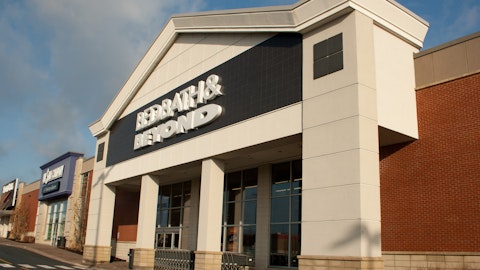Simeon Guttman: Hey, Gary. Hey, Jack. My question — one question maybe two parts is, you mentioned product transformation and margin dilution. Is that all contained to ’23 or did some of it move into ’24? And then, Gary, to your point, if this market wallows a little and we do have another downdraft, given that you have leverage or the business has leveraged now, or little more than that it’s normally used to, do you operate anything differently if the macro just takes longer to come out and then maybe the curve is steeper in later years but it’s flatter in the medium term?
Gary Friedman: Yeah. I think by the first half of next year the inflection is going to be much more significant than the macro. So I don’t think it changes anything for us.
Jack Preston: On the margin dilution, Simeon, look I think about it also just — where the margin or the discounting activity and clearance of that inventory will be in Q1 of ’24 versus Q1 of ’23. So, yeah, there’s going to be still some of that in the first part of the year.
Gary Friedman: But there’s going to be — I think about it there’s two things, right? You’ve got margin dilution from a product margin point of view as we’re transitioning the assortments and — but you’re going to have leverage and margin accretion throughout the model based on what we believe will happen with our top line. So, yeah, I think ’24 is going to be a very good year. Unless there is some kind of crazy crisis that we don’t believe is on the horizon. I think that the history would tell us, if things really got worse at the Fed is going to ease. If I look back at the last 20 years, I mean, the Fed’s been very consistent. We’ve lived in a very long period of really low on interest rates with just a few slight blips that are high and I think the Fed will act in a way that will stimulate the economy again.
So — and then housing will at some point the housing will take off, right? You’ve got a lot of pent-up demand. It’s just that the demand can be super pent-up but if the gap doesn’t change, right? If either pricing doesn’t come down or interest rate gap doesn’t change, interest rates have come down. One of the two things happens. If they both happen, the prices come down and the Fed eases, you can get a — I think we can get a really good bounce in the housing market. But we just can’t control that. We have a point of view on it, share our point of view looking at a lot of things and we got a lot of data that we study. The key for us is like if you’re — if we think about the balance sheet, which we do, we deployed a lot of capital, we have a lot of confidence in the model.
We’re in the middle of a transformation. It’s not — this is not by any means the first time we’ve done it. It’s the biggest thing we’ve ever done. But our experience in making moves like this is deeper than anyone in this industry and we’re laser-focused on it and we understand our balance sheet really well and what our cash flow is going to be like. And the timing of capital outflows and projected inflows and we hit all kinds of downside models and know how to operate in any kind of environment — any kind of difficult environment. I mean, so we don’t fear the leverage and we’ve had a lot more leverage on this business and people have seen us navigate through those situations in a relatively uninterrupted way except for the real depths of 2008-09 or something like that.
So we feel great. But I think the key headline, I’d say, I just would be really — it would be shocking if we don’t outperform whatever macro might happen in the first half of next year unless it is so severe that it becomes some kind of a crippling thing across the economy, and I just don’t think that’s going to happen. I think that the Fed is going to do the things that the Fed usually does. And if we get any kind of stabilization or uptick in the market, like, we will have an incredible year. So, I think we’re set up better than we’ve ever been set up in the history of the business and I think we’ll have the biggest inflection point we’ve ever had is my view by Q2 of next year. Like, there’ll be an inflection point before that, but I think will peak.
When I look at all the lines and I think about production and in-stocks and floor sets and all that, all the transition moves we have to make, I think that when that second cycle of the books, I think it will start to peak then and then I think we’re going to have an incredible run.
Operator: Your next question comes from the line of Steven Zaccone from Citi. Please go ahead.
Steven Zaccone: Good afternoon. Thanks for taking my question. So I wanted to shift to the RH England opening. It sounds like it’s a good successful opening event, but it will take some time to maturity. Do you expect the rest of your international openings to resemble this maturity curve or is this the longest one since it’s kind of your first? And then similarly the letter confirmed nine international openings by 2025. Can you talk a bit more about the pace of annual openings for international going forward? Is three kind of the right number? Thanks.
Gary Friedman: Yeah. Let’s start with first one. One, RH England is unlike anything we’ve ever opened, not just because of an international perspective, but really the kind of location and our view of how we wanted to introduce the brand and when we wanted to introduce the brand. When we wanted to introduce the brand in a very unique and unforgettable fashion. Just because the US isn’t really seen from a European perspective when you think about design taste and style luxury market so on and so forth. That’s not really the game we play really well. I think I made the comment before. The only true luxury brand we’ve had I think in the United States is Tiffany, and now the French own it, right? And all the luxury brands are from Europe.
So how are we going to go into that world and introduce ourselves? We thought that was really important. And so — and we also thought the timing, like how do we kind of get their name known and establish ourselves in a unique way. And we could have waited and opened Paris first store, we could have waited and opened London first. We would have had to wait longer and we came across this opportunity at this property and we thought this could be something remarkable. It could be a really great introduction for the brand. And I’ve always said that we’ve made the decision on RH England because of its location. It’s an hour and 45 minutes outside of London. It’s in the Cotswolds, it’s around wealthy and affluent people, but it’s not around density.
You don’t have anybody kind of walking by this Gallery. Like it’s not. It is a true destination and it’s you kind of got to go out of your way. But you’re going to something spectacular that you’ve never seen before. So the impression of it is like nothing else, and I don’t want to make the wrong comparison here, but if you just think about kind of things that have went into the — what I call the middle and nowhere and changed everything, you think about Disneyland. Disneyland opened in the middle of nowhere. If you went back, when they opened, that’s the middle of an orange orchard and there was no one around. No one — there was no population density anywhere near it. And it changed everything. If you think about, you know, Las Vegas. Las Vegas didn’t exist.
It was created and I’m not trying to make a correlation that’s exactly right. What I’m trying to say is, we’re trying to create a brand at a level of the market that hasn’t been created before. And our view was that this was a decision that was more to drive a conversation than it was to drive commerce. We never thought this was going to be a high-volume gallery. But we didn’t think it’d be no volume. I think it’s going to be fine. I think it would take much line. If you took anything like this and put it in London, I mean it’s going to do multiple times immediately multiple times faster, it’s a little inconvenient. But it’s extraordinary. And a lot of really extraordinary things in the world started to have been inconvenient, right? It was inconvenient to get an iPhone, inconvenient to get a Tesla.




